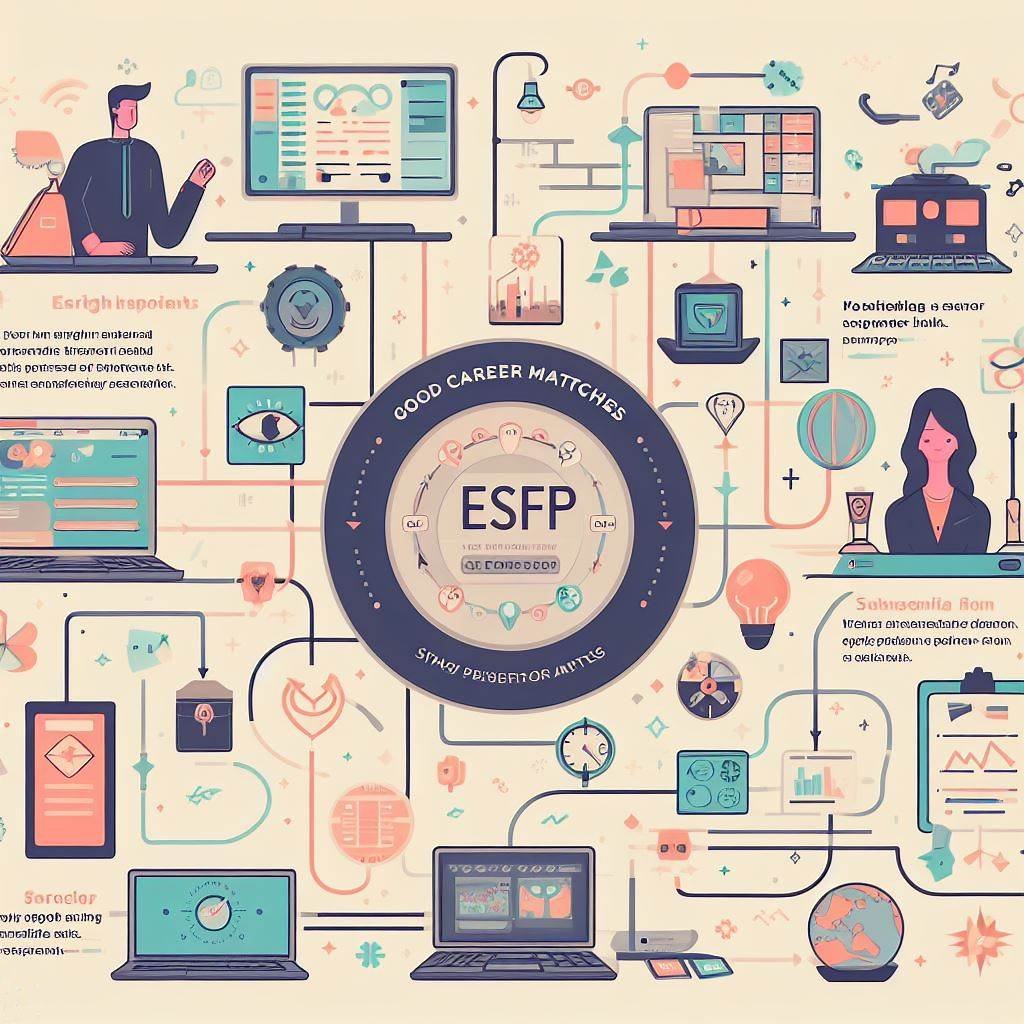
The ESFP personality type is defined by a passionate, bold approach to life. This type thrives on spontaneous action and immersing themselves fully in the present experience. ESFPs account for about 4% of the population, preferring hands-on environments where their outgoing energy and flair for drama can be expressed.

As extroverted sensors, ESFPs are highly observant of the physical world and focused on tangible realities. They notice facts and details that others miss. Their secondary function is introverted feeling (Fi), giving ESFPs a strong internal value system and desire to connect emotionally. Extroverted intuitives bring a spirit of innovation and future possibilities. But inferior introverted thinking (Ti) can make structured logic a struggle at times. Overall, ESFPs are vivacious thrill-seekers constantly searching for the next exciting adventure. They inject fun and joy into everything they do.
ESFPs are defined by their zest for life and ability to fully engage their senses. As outgoing extroverts, they gain energy from interacting with people and thrive at the center of activities. ESFPs are typically:
Excited and enthusiastic - ESFPs bring contagious excitement to their environments. They're passionate about anything new and fun.
Action-oriented - Sitting still for too long is torture for ESFPs. They leap into activities and learn as they go.
Spontaneous - Rules and rigid schedules stifle ESFPs. They prefer improvising and trying novel experiences on a whim.
Playful - ESFPs maintain a youthful, lighthearted spirit. They try to inject fun into everything through jokes and high energy.
Adventurous - From skydiving to world travel, ESFPs are up for anything thrilling. Boredom is their enemy.
Generous and people-focused - ESFPs enjoy the spotlight but also value connections. They try to make people happy.
Expressive - ESFPs are emotionally transparent and dramatic in their communication. They convey enthusiasm through their words and body language.
Distractible - ESFPs flit between activities quickly, especially those involving people or instant gratification. Focus can be fleeting.
Avoidant of tedious logic - ESFPs gravitate toward hands-on tasks and interactive roles. Heavy data analysis does not come naturally.
Dislike of strict rules - ESFPs resist anything that restricts their independence or spontaneity. They may cut corners to maintain freedom.
In relationships and team roles, ESFPs are loyal, supportive partners who add excitement. Their academic and career interests lean toward active or artistic pursuits that engage their senses and allow freedom. Structure is not their strength, but ESFPs compensate with passion, charisma and willingness to dive in.
ESFPs are blessed with many natural talents that provide value to families, teams, and workplaces:
The most noticeable ESFP trait is their sheer enthusiasm. They approach everything with excitement and joy that motivates others. ESFPs make even mundane tasks fun.
While others deliberate, ESFPs get started. They possess raw energy for jumping into hands-on projects. ESFPs learn quickly through active experimentation.
ESFPs are masters of thinking on their feet. They easily improvise solutions and adapt to new people or environments. This allows them to thrive in fluid situations.
ESFPs are not afraid to take risks or put themselves out there socially. Their adventurous spirit helps them seize opportunities even in the face of uncertainty.
Outgoing and empathetic, ESFPs excel at connecting, entertaining and persuading people. They build relationships effortlessly.
ESFPs notice and appreciate beauty in their surroundings. Their artistic flair enhances visual appearance and draws attention.
ESFPs know how to soak up every enjoyable aspect of an experience. They keep life fun by being fully immersed in the present.
ESFPs' many gifts stem from their playful, audacious approach to the world. They bring vitality and passion to teams and relationships.
While ESFPs shine in many areas, some aspects of life are more challenging. Potential weaknesses include:
Focused on the moment, ESFPs often fail to set concrete goals or evaluate future risks. They dive into projects without plotting each step, which can cause problems.
The daily grind bores ESFPs quickly. Unless forced to follow procedures, ESFPs will forego rules and take shortcuts, sometimes causing inefficiency or mistakes.
ESFPs often fail to consider every option or weigh pros and cons before charging ahead. Their impulsiveness can lead to regrettable choices.
Without defined processes, ESFPs struggle to organize thoughts or complete complex sequential tasks. They need structure from others.
Although intelligent, ESFPs prefer action to rigorous fact-finding or data analysis. Developing ideas fully before acting can be a stretch.
When tasks turn tedious, ESFPs lose interest quickly. They may bounce between activities to avoid boredom rather than pushing through.
Guided by personal values, ESFPs sometimes overlook objective facts. Their emotions or desire to please may skew logic.
ESFPs dislike criticizing people or being criticized. They may paper over differences rather than resolving issues directly.
Knowing their potential pitfalls allows ESFPs to consciously develop better planning habits, patience, and analytical skills. But they will always thrive most when active and inspired.
ESFPs make warm, enthusiastic partners who crave new experiences. Still, some personality types mesh better than others with the ESFP.
ESTP Shared spontaneity and boldness. Constant excitement. Intuition supports sensing.
ISFP Mutual artistic flair and distaste for routine. Both introverted feeling types.
ENFP Complementary traits cover planning, logic and imagination. Intuition provides structure.
ENTJ ESFP brings fun and ENTJ provides organized direction. Feeling supports thinking.
INTJ INTJs may frustrate ESFPs by overanalyzing everything. Sensing clashes with intuition.
INFJ INFJs are deep and complex while ESFPs are simple and transparent. Feeling vs. feeling.
ISTJ
ISTJs love routines versus ESFPs' need for thrills. Judging opposes perceiving.
INTP ESFPs are uncomfortable with INTPs' detached intellectualism. Logic conflicts with emotion.
Naturally, any relationship involves compromise. But ESFPs often find themselves butting heads with partners who prefer a strictly logical, predictable approach. Developing patience and analytical skills fosters better understanding.
ESFPs thrive in careers that satisfy their need for freedom and hands-on variety. Suitable work options include:

Performer - ESFPs shine as actors, musicians, dancers or comedians. The arts allow full creative expression.
Counselor - Helping and connecting with people suits the empathetic ESFP. They draw out others.
Interior Designer - ESFPs have a natural flair for aesthetics. They easily envision and actualize beautiful spaces.
Event Planner - ESFPs know how to orchestrate memorable experiences. They excel at entertainment and excitement.
Teacher - ESFPs engage students with dynamic lessons and make education fun. Flexibility is required.
Athletic Coach - The ESFP competitive spirit and people skills shine coaching sports teams.
Salesperson - Persuading and interacting with clients comes easily to expressive ESFPs.
Therapist - Listening and empowering people aligns perfectly with ESFP strengths.
Entrepreneur - Bold ESFPs often start their own companies, thriving on risk and independence.
Pilot - ESFPs love adventure and split-second action. Their senses stay keen and alert.
Careers that provide variety, human interaction, and freedom allow ESFPs to fully leverage their gifts. They excel when inspired and may wilt in overly analytical or desk-bound roles.
To reach their full potential, ESFPs should focus on improving skills outside their comfort zone such as:
ESFPs live spontaneously, but setting measurable goals for the future can help build structure. Visual aids like vision boards make plans more concrete.
Noticing subtleties and inconsistencies can help ESFPs avoid errors and see new possibilities. Slowing down to fully soak up data stretches sensing skills.
ESFPs must practice objective analysis to balance emotion. Taking time to research facts, outline pros and cons, and spot fallacies strengthens logic.
Jumping between activities is natural for ESFPs but reduces efficiency. Setting a timer and working diligently on one project improves concentration.
Writing journals, stories or long emails improves organizational skills and idea development. ESFPs benefit from putting thoughts on paper.
Finding small ways to inject fun into mundane tasks can help ESFPs maintain energy for routine. Adding music or social interaction could help.
ESFPs avoid inactive time, but reflection is nourishing. Meditation, reading and solo nature walks can energize ESFPs differently.
By developing their less preferred skills - planning, focusing, analyzing - ESFPs become well-rounded and succeed in a wider range of environments. But they should still capitalize on their natural gifts as much as possible.
ESFPs make up about 4% of the general population. Notable figures displaying ESFP characteristics include:
Walt Disney
The masterful entrepreneur transformed cartoons into an imaginative empire through bold vision, showmanship and focus on entertaining others.
Eddie Murphy
The renowned comedian has improvised many memorable film and stage performances. His humor springs from an outgoing, dramatic nature.
Marilyn Monroe
Forever iconic for her beauty, dramatic flair, and bold spirit, Monroe epitomized vivaciousness on screen and stage.
Elvis Presley
With his flashy performance style and rebellious charm, Presley displayed classic ESFP traits of passion and showmanship.
Benjamin Franklin
Although intellectual, Franklin embraced ESFP joie de vivre. His innovations benefited people, and he relished social gatherings.
Prominent ESFPs excel at delighting audiences through their warmth, boldness, and flair for the dramatic. They live life to the fullest and encourage others to do the same.
For ESFPs, the thrill is in the moment. They fully engage their keen senses to soak up pleasurable environments and experiences. ESFP strengths include enthusiasm, improvisation, boldness, and connecting with people. They excel when interacting, creating, and moving freely. Routines and strict analysis frustrate ESFPs, but they contribute immense joy and spirit to teams and relationships. By developing planning and analytical skills, ESFPs become well-rounded, achieving even greater life satisfaction through their playful, audacious approach.